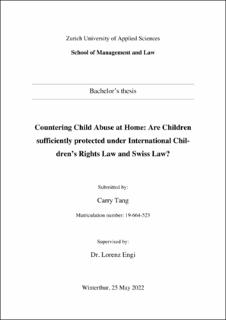Please use this identifier to cite or link to this item:
https://doi.org/10.21256/zhaw-26715Full metadata record
| DC Field | Value | Language |
|---|---|---|
| dc.contributor.advisor | Engi, Lorenz | - |
| dc.contributor.author | Tang, Carry | - |
| dc.date.accessioned | 2023-01-26T09:44:53Z | - |
| dc.date.available | 2023-01-26T09:44:53Z | - |
| dc.date.issued | 2022 | - |
| dc.identifier.uri | https://digitalcollection.zhaw.ch/handle/11475/26715 | - |
| dc.description.abstract | The United Nations Convention on the Rights of the Child (CRC) is the most widely ratified international law instrument. The CRC promises every child protection against violence, yet reports show that 3 in 4 children aged 2 to 4 years have repeatedly suffered physical punishment and/or psychological violence at the hands of parents and caregivers. This Bachelor’s thesis investigates to what extent children are protected against abuse at home under the international and the Swiss legal framework and if there is a further need for action. The research focuses on the provisions of the CRC and their implementation by various actors, and respective norms of Swiss constitutional, criminal, and civil law as well as the jurisprudence of the Swiss Federal Supreme Court. The results show that the Convention protects children from all forms of violence at home, however, without expressing an obligation to explicitly anchor this protection in domestic law. The CRC Committee solely emphasizes that corporal punishment by parents and caregivers, however light, is incompatible with the child’s best interests and thus prohibited under the CRC. The State Party is required to take appropriate measures against child harm and establish mechanisms for the response to such harm. Despite conducting a periodic reporting process at the level of the CRC Committee, its recommendations toward States Parties to enhance their implementation of the CRC lack binding character and are thus challenging to enforce. At the Swiss level, no similar code of children’s rights exists. Nevertheless, the Constitution enshrines the right of children and young people to be afforded special protection, based on which legislative bodies have adopted respective laws. The Criminal Code punishes, i.a., perpetrators of acts of aggression that exceed what is accepted by social customs. The Swiss Federal Supreme Court, however, has not asserted an absolute prohibition of corporal punishment: The educational right of parents justifies acts of aggression insofar as they are not repeated and therefore not prosecuted ex officio. The lack of a legislative right to non-violent education has been heavily criticized by the CRC Committee as well as NGOs and led to unsuccessful parliamentary initiatives until such a right was finally accepted by the National Council in September 2021. This is a first step toward ensuring the physical integrity of children as guaranteed by the Constitution. The Civil Code anchors the rights and duties of parents and caregivers toward their children, notably parental responsibility and the educational right of parents. For prevention rather than repression, it also sets forth a graduated set of child protection measures in case of parental misconduct, with parental responsibility being withdrawn as ultima ratio. Despite having sufficient laws, their enforcement remains difficult. There is a need for continuous educational training for those involved in child protection and more widespread awareness campaigns. Lastly, the prevalent focus on civil law measures rather than criminal liability needs to be rethought to prevent further child harm from reoccurring. | de_CH |
| dc.format.extent | 81 | de_CH |
| dc.language.iso | en | de_CH |
| dc.publisher | ZHAW Zürcher Hochschule für Angewandte Wissenschaften | de_CH |
| dc.rights | https://creativecommons.org/licenses/by-nc-nd/4.0/ | de_CH |
| dc.subject.ddc | 341: Völkerrecht und Europarecht | de_CH |
| dc.subject.ddc | 342: Öffentliches Recht (CH), Staats- und Verwaltungsrecht | de_CH |
| dc.title | Countering child abuse at home : are children sufficiently protected under international children’s rights law and Swiss law? | de_CH |
| dc.type | Thesis: Bachelor | de_CH |
| dcterms.type | Text | de_CH |
| zhaw.departement | School of Management and Law | de_CH |
| zhaw.publisher.place | Winterthur | de_CH |
| dc.identifier.doi | 10.21256/zhaw-26715 | - |
| zhaw.originated.zhaw | Yes | de_CH |
| Appears in collections: | BSc Wirtschaftsrecht | |
Files in This Item:
| File | Description | Size | Format | |
|---|---|---|---|---|
| 2022_Tang_Carry_BSc_WR.pdf | 648.24 kB | Adobe PDF |  View/Open |
Show simple item record
Tang, C. (2022). Countering child abuse at home : are children sufficiently protected under international children’s rights law and Swiss law? [Bachelor’s thesis, ZHAW Zürcher Hochschule für Angewandte Wissenschaften]. https://doi.org/10.21256/zhaw-26715
Tang, C. (2022) Countering child abuse at home : are children sufficiently protected under international children’s rights law and Swiss law? Bachelor’s thesis. ZHAW Zürcher Hochschule für Angewandte Wissenschaften. Available at: https://doi.org/10.21256/zhaw-26715.
C. Tang, “Countering child abuse at home : are children sufficiently protected under international children’s rights law and Swiss law?,” Bachelor’s thesis, ZHAW Zürcher Hochschule für Angewandte Wissenschaften, Winterthur, 2022. doi: 10.21256/zhaw-26715.
TANG, Carry, 2022. Countering child abuse at home : are children sufficiently protected under international children’s rights law and Swiss law? Bachelor’s thesis. Winterthur: ZHAW Zürcher Hochschule für Angewandte Wissenschaften
Tang, Carry. 2022. “Countering Child Abuse at Home : Are Children Sufficiently Protected under International Children’s Rights Law and Swiss Law?” Bachelor’s thesis, Winterthur: ZHAW Zürcher Hochschule für Angewandte Wissenschaften. https://doi.org/10.21256/zhaw-26715.
Tang, Carry. Countering Child Abuse at Home : Are Children Sufficiently Protected under International Children’s Rights Law and Swiss Law? ZHAW Zürcher Hochschule für Angewandte Wissenschaften, 2022, https://doi.org/10.21256/zhaw-26715.
Items in DSpace are protected by copyright, with all rights reserved, unless otherwise indicated.